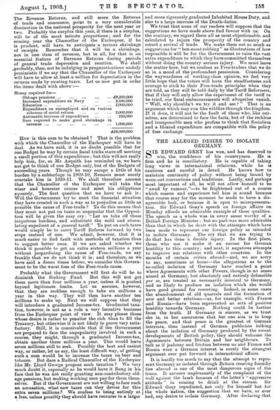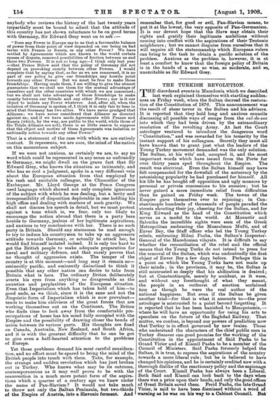THE ALLEGED DESIRE TO ISOLATE GERMANY.
SIR EDWARD GREY has won, and has deserved to win, the confidence of his countrymen. He is firm and he is conciliatory. He is capable of taking long views in international relations, while he is cautious and careful in detail. He knows how to maintain continuity of policy without being bound by worn-out conventions and traditions. Lastly, and perhaps most important of all, he will not allow himself to be " awed by rumour,"—to be frightened out of a course which reason and experience tell him is sound because that course may for the moment be made to have a dis- agreeable look, or because it is open to misrepresenta- tion. Sir Edward Grey's speech on foreign affairs on Monday affords an admirable example of these qualities. The speech as a whole was in every sense worthy of a British Foreign Minister ; but no part was more admirable than that in which lie dealt with the attempts which have been made to represent our foreign policy as intended to isolate Germany. The cry that we are trying to do that has done a double injury. In the first place, those who use it make it an excuse for German hostility to this country ; and next, it negatives attempts to improve our relations with other countries. In the mouths of certain critics abroad—and, we are sorry to say, sometimes at home—the allegations as to the so-called isolation of Germany have reached a point where Agreements with other Powers, though in no sense aimed at Germany, but absolutely and entirely defensible per se, are treated as necessarily inimical to Germany, and as likely to produce an isolation which she would have good ground for resenting. Indeed, in some cases the abandonment of old quarrels and the formation of new and better relations—as, for example, with France and Russia--have been represented as acts of positive hostility towards Germany. Nothing could be farther from the truth. If Germany is sincere, as we trust she is, in her assurances that her one aim is to keep the peace, and that peace is the greatest of German interests, then instead of German publicists talking about the isolation of Germany produced by the recent developments of British policy, they should welcome the Agreements between Britain and her neighbours. To talk as if jealousy and friction between us and France and Russia were a German interest is surely the strangest argument ever put forward in international affairs.
It is hardly too much to say that the attempt to repre- sent Germany as isolated through Britain creating friendly ties abroad is one of tthe most dangerous signs of the times. It savours uupleasautly of the complaint of the wolf against the lamb because of the latter's " aggressive attitude " in coming to drink at the stream. Sir Edward Grey repudiated, not only for himself but for the whole nation, the suggestion that we have, or ever had, any desire to isolate Germany. After declaring that anybody who reviews the history of the last twenty years impartially must be bound to admit that the attitude of this country has not shown reluctance to be on good terms with Germany, Sir Edward Grey went on to ask :— " Does any Power in Europe say to us that a favourable balance of power from their point of view depended on our being on bad terms with France or Russia, or any other Power ? We have settled by Agreements which are known to the world certain causes of dispute, removed possibilities of friction between us and these two Powers. It is not so long ago—I think only last year '.that Prince Billow said that the policy of Germany did not depend on provoking enmity between other Powers. I would complete that by saying that, as far as we are concerned, it is no part of our policy to give our friendships any hostile point towards any other Power. But we must be free to make those friendships. Having made them, I am willing to give the utmost guarantees that we shall use them for the mutual advantage of ourselves and the other countries with which we are concerned ; but we shall not take advantage of those friendships to make enmity between our friends and any other Power; nor is it our object to isolate any Power whatever. And, after all, when the isolation of Germany is spoken of, I think it is only fair to bear in mind that Germany has two allies. We have never grudged that Alliance ; we have never considered that Alliance as directed against us; and if we have made Agreements with France and Russia (which, by the way, are public to the world, while those of the Triple Alliance are not), there is as little reason to suppose that the object and motive of these Agreements was isolation or unfriendly action towards any other Power."
That is a statement of the case with which we are entirely content. It represents, we are sure, the mind of the nation on this momentous subject.
If we were not anxious, as certainly we are, to say no word which could be represented in any sense as unfriendly to Germany, we might dwell on the grave fact that Sir Edward Grey, who knows the situation so intimately, and Who has so cool a judgment, spoke in a very different vein about the European situation from that employed by his rash and excitable colleague, the Chancellor of the Exchequer. Mr. Lloyd George at the Peace Congress used language which showed not only complete ignorance of the subject with which he was dealing, but a levity and irresponsibility of disposition deplorable in one holding his high office and dealing with matters of such gravity. We shall not discuss his speech in detail, but we must protest against a tone which is, we fear, only too likely to encourage the notion abroad that there is a party here hostile to Germany, jealous of her legitimate aspirations, and anxious to try conclusions with her. There is no such party in Britain. Should any statesman be mad enough to try to induce his countrymen to take up an aggressive attitude towards Germany, or actually to attack her, he would find himself isolated indeed. It is only too hard to get the British people to make adequate preparation for naval and military defence, and that surely proves that no thought of aggression exists. The temper of the country is at this moment—and long may it remain so— eminently pacific, and eminently disinclined to think it possible that any other nation can desire to take from Britain what is hers. The ordinary Briton deliberately averts his eyes from anything so disagreeable as the anxieties and perplexities of the European situation. Even that Imperialism which has taken hold of him—to good ends, as we think, since it is the sane and not the Jingoistic form of Imperialism which is now prevalent— tends to make him oblivious of the great forces that are working themselves out on the Continent. The triton who finds time to look away from the comfortable pre- occupations of home has his mind fully occupied with the Empire and the possibility of drawing closer the bonds of union between its various parts. His thoughts are fixed on Canada, Australia, New Zealand, and South Africa, and it is with the greatest difficulty that he can be got to give even a half-hearted attention to the problems of Europe.
Yet those problems demand his most careful considera- tion, and no effort must be spared to bring the mind of the British people into touch with them. Take, for example, the strange and sudden revolution which has just broken out in Turkey. Who knows what may be its outcome, contemporaneous as it May well prove to be with the resurrection in a much more potent form of the aspira- tions which a, quarter of a century ago we knew under the name of Pan-SlaVisin It would not take much to throw not only the Balkan Peninsula., but two-thirds of the Empire of Austria, into a Slavonic ferment; And remember that, for good or evil, Pan-Slavism means, to put it at the lowest, the very opposite of Pan-Germanism. It is our devout hope that the Slays may obtain their rights and gratify their legitimate ambitions without coming into conflict with the aspirations of their Teutonic neighbours ; but we cannot disguise from ourselves that it will require all the statesmanship which European rulers can bring to the task to obtain a pacific solution of the problem. Anxious as the problem is, however, it is at least a comfort to know that the foreign policy of Britain is in the hands of a man so wise, so moderate, and so. unexcitable as Sir Edward Grey.



































 Previous page
Previous page